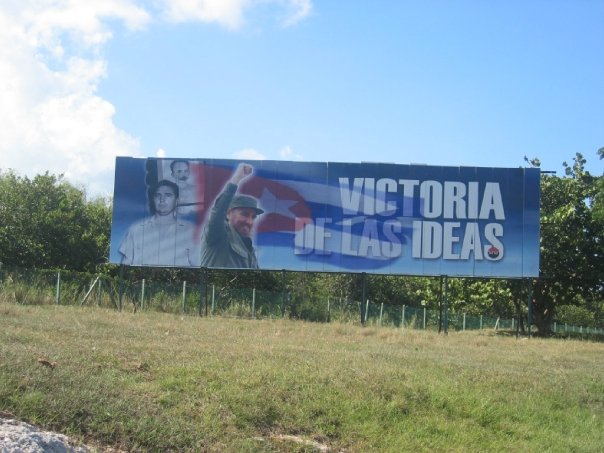The highways leaving the vicinity of Jose Marti airport in Havana are lined with messages of propaganda. Billboard after billboard tout the socialist agenda with phrases such as “Tenemos y Tendremos Socialismo,” “Che: Su Ejemplo Vive,” and “Victoria de Las Ideas.”
In 1959, Fidel Castro and Che Guevera set out to create a so-called “equal standard of living” for all Cubans. In some respect the two revolutionaries have achieved that: every Cuban is equally oppressed and impeded from pursuing their goals and achieving their dreams. If that is the “equality” the revolutionaries sought to bring about, they have certainly attained it.
During my visit to the island nation, I was disheartened but not surprised by the government-imposed segregation. Only if you are a tourist, diplomat, or one of the Castros’ cronies are you treated with any dignity and approbation. Cubans are usually denied entrance into touristic hotels, resorts, and restaurants in an effort to prevent interactions with tourists that would shed light on the real Cuban life. The regime much rather have visitors believe Cuba is a wondrous nation with superb healthcare and social equality for all as depicted in the so-called journalistic documentaries of leftist filmmakers Oliver Stone and Michael Moore. This is especially ironic considering most Cubans don’t even have access to aspirin or toilet paper.
The most harmful economic disparity for the Cuban people is the existence of two currencies in use on the island nation. There is the Cuban Peso, the currency the government pays its citizens, and the Convertible Peso, the currency in which most goods are denominated and sold. The average Cuban worker earns 250 pesos a month, the equivalent of USD $10. However, most stores, whether touristic or not, sell goods in the much stronger Convertible Peso (C.U.C.). Even more astounding is that the C.U.C. is worth more than the U.S. dollar.
At the time of my visit, the exchange rate was USD $1 for .80 C.U.C. In other words, if someone earns the equivalent of only 10 C.U.C. a month, they would have to spend nearly half of their monthly income to purchase a bottle of shampoo. In a grocery store on a Havana block outside of the tourist district, a can of string beans costs 2 C.U.C., a six pack of toilet paper is 2 C.U.C., and a small package of olives was 3 C.U.C. Imagine working an entire month for a salary with the meager purchasing power to buy one can of string beans, a package of toilet paper and two small packages of olives.
To survive, virtually every Cuban operates a business outside of the official economy. Whether it’s selling pirated DVDs they burn, used cell phones, or bootleg clothing, Cubans find ways to make ends meet, but only barely. The Cuban government often touts its high literacy rate and education system. However, a great education – if it in fact exists – is useless if there are no jobs and no pay. Driving down most main streets, you see young women who are doctors, lawyers, and engineers hitchhiking and offering sex in exchange for car rides, food or money.
Consider also that the talents of professionals, skilled workers and other educated Cubans are made less useful by the lack of information flowing to the island, and therefore workers encounter no changing situations to which education and skills are applied. Information outside of revolutionary propaganda is hard to come by, as are methods of information gathering we take for granted. Not only do most Cubans not have any form of Internet access, they are astounded by the technologies and connectivity that is commonplace outside of the regime: home high-speed Internet, Internet on mobile devices, and Americans’ prevalent cell smart phone ownership.
There is no sense of hope or purpose in Cuba and no feelings of accomplishment, as there are no goals in Cuban life. Imagine living in an island paradise where you could never eat in a nice restaurant, or stay at a hotel while visiting a neighboring town, or even visit a museum with your children. What kind of life would that be?
To those living in Cuba, the basic freedoms that many Americans take for granted are merely an illusion. As Americans, we should always be grateful for the privileges afforded us and appreciate those who have fought and died to protect them, because on an island 90 miles away, 12 million people are, without question, denied those same luxuries and liberties.
* Nicole Malliotakis is a government relations professional living in New York. Prior to her career in the private sector, she was a public liaison and advisor to former Governor George Pataki. She traveled to Cuba for 10 days in November 2009.
Source: FreeMarketeros












Discussion
No comments for “No Goals in Cuban Life – by Nicole Malliotakis”